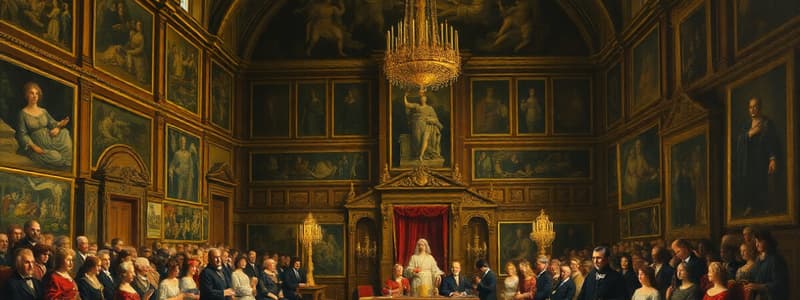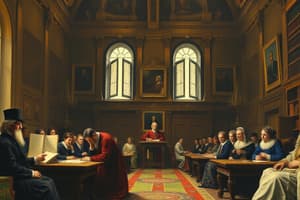Podcast
Questions and Answers
Which of the following statements is true regarding the membership of the House of Lords?
Which of the following statements is true regarding the membership of the House of Lords?
- Members are elected by the public during general elections.
- Members are appointed based on special rank and merit. (correct)
- All members are Lords Spiritual.
- Membership can be inherited by anyone in the peer's family.
What distinguishes life peers from hereditary peers in the House of Lords?
What distinguishes life peers from hereditary peers in the House of Lords?
- Hereditary peers are never appointed for their service.
- Hereditary peers do not retain their titles upon retirement.
- Life peers can pass their titles on to their children.
- Life peers do not become part of the aristocracy. (correct)
What major change occurred in the House of Lords as a result of the 1999 Labour government reforms?
What major change occurred in the House of Lords as a result of the 1999 Labour government reforms?
- Life peerages were abolished.
- All hereditary peers were allowed to sit permanently.
- The automatic right of hereditary peers to sit and vote was removed. (correct)
- The number of Lords Spiritual was doubled.
How many hereditary peers were allowed to remain in the House of Lords after the 1999 reforms?
How many hereditary peers were allowed to remain in the House of Lords after the 1999 reforms?
Who are considered Lords Spiritual in the House of Lords?
Who are considered Lords Spiritual in the House of Lords?
What was the significant change introduced by the Constitutional Reform Act of 2005?
What was the significant change introduced by the Constitutional Reform Act of 2005?
What distinguishes the atmosphere in the House of Lords from that in the House of Commons?
What distinguishes the atmosphere in the House of Lords from that in the House of Commons?
What does the presence of cross-benches in the House of Lords signify?
What does the presence of cross-benches in the House of Lords signify?
How are life peers primarily characterized in terms of political allegiance?
How are life peers primarily characterized in terms of political allegiance?
Which feature of the House of Lords is mentioned as more lavish compared to the House of Commons?
Which feature of the House of Lords is mentioned as more lavish compared to the House of Commons?
Flashcards
What is the House of Lords?
What is the House of Lords?
The House of Lords is a legislative body in the UK Parliament, historically composed of members with special ranks and titles.
Who are the Lords Temporal?
Who are the Lords Temporal?
Lords Temporal are members of the House of Lords who hold aristocratic titles (peerages), traditionally chosen by the monarch for merit or service.
What is a Life Peerage?
What is a Life Peerage?
A life peerage is a title granted to individuals for their achievements and service, not inheritable by their children. They are appointed for life and cannot pass the title on.
How was the House of Lords reformed?
How was the House of Lords reformed?
Signup and view all the flashcards
Who sits in the present House of Lords?
Who sits in the present House of Lords?
Signup and view all the flashcards
Life peers
Life peers
Signup and view all the flashcards
Lord Speaker
Lord Speaker
Signup and view all the flashcards
Woolsack
Woolsack
Signup and view all the flashcards
Cross-benches
Cross-benches
Signup and view all the flashcards
Queen's Speech
Queen's Speech
Signup and view all the flashcards
Study Notes
The House of Lords
- Not an elected body; members based on social standing or appointment.
- Two main types of members:
- Lords Spiritual: Archbishops and senior Church of England bishops.
- Lords Temporal: Important noblemen (peers).
- Peerage: Aristocratic title.
- Originally hereditary titles granted by the monarch for service or merit; often associated with geographic locations (e.g., Duke of Buckingham).
- Peerages were inherited by the eldest male heir. With no male heir, titles reverted to the monarch who potentially granted it to another family.
- This system created the British aristocracy.
- 20th-century decline in significance with over 700 hereditary peers.
- 1958: Introduction of life peerages, not inheritable. Awarded to prominent figures (former ministers, judges, etc.).
- 1999: Labour government reform removed automatic hereditary peer representation. A compromise elected 92 hereditary peers for an unspecified duration.
- Current Composition (2014):
- 26 hereditary peers.
- 2 Archbishops and 24 senior bishops (Lords Spiritual).
- 92 elected hereditary peers.
- Life peers (number fluctuates, exceeds 600).
- Lord Chancellor:
- Cabinet member, equivalent to a European minister of justice.
- Leader of England's highest court of appeal. Thus, is a key figure in legislative, executive and judicial branches.
- Removed from the Lords leadership position in 2005.
- Current Leadership (since 2006): Elected Lord Speaker
- House of Lords Chamber:
- Similar layout to the Commons chamber (rows of benches).
- More ornate decorations.
- Includes the monarch's throne for the Queen's Speech.
- Lord Speaker/deputy sits on a "Woolsack."
- Separate cross-benches exist for independent members.
- Party Affiliation:
- Traditionally a Conservative majority due to hereditary peers' historical connection to the Conservative Party.
- Removal of most hereditary peers in 1999 shifted party balance, leading to more Labour life peers.
- Lords Critique of Government:
- Peers, being less constrained by party politics tend to express more critical views of government proposals than MPs.
- This independence allows them to reflect public opinion.
- Chamber (Lord's) Atmosphere:
- Generally described as maintaining higher standards of politeness compared to the Commons.
Studying That Suits You
Use AI to generate personalized quizzes and flashcards to suit your learning preferences.




